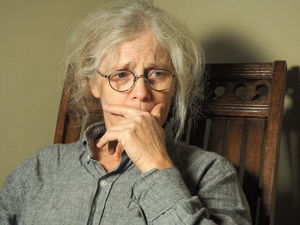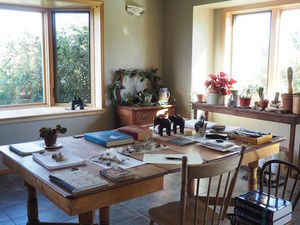At the Desk: Nora Gould
Nora Gould's newest collection of poetry, Selah (Brick Books), is a long poem that engages with the titular term. Drawn from the Old Testament, 'selah' might mean to praise, to lift up, to pause, to end, or it may simply be a musical notation in the lyrical books where it appears. Gould takes on each of these possible meanings in a dynamic piece that moves from the expanse of Alberta ranch land to the intimacy of the home — and in particular, the home as shared with a partner recently diagnosed with dementia.
The speaker is dealing with her husband's diagnosis through the lens of both the past and the future, and the book has been praised by poet Lorna Crozier, who said of Selah "This poem never slips into sentimentality... but it breaks the heart".
We're pleased to welcome Nora to Open Book today to take us into the space where she wrote Selah, as part of our At the Desk series. She tells us about her highly unusual (and mobile) writing perch, writing on her jeans in a pinch, and writing with a background odour of owl.
Nora Gould: At the Desk
I write in tractors, the John Deere 7810 while I pick up grain from the combine and the 4230 and 4440 when hauling bales. For the latter, I move as needed to facilitate the loading then lumber down the road, meet the returning outfit, and exchange. I grab my cloth bag — pad of lined yellow paper, pens, and water bottle — and emerge into fall air colder than the sunshine suggests. In that space, the interruption of driving and climbing out and back into another tractor cab, which doesn’t always feel timely for my writing, phrases and words jostle around, re-arrange, and change. The to-me steep hills and the accompanying adrenaline likely have an effect too.
For other outside-the-house work, I have paper in jacket pockets and if not, I can write on my jeans or overalls. My faded clothes take the ink best (examine before laundering). No one has complained when I’ve turned ahead in the feed record or bale book to make notes.
At the house I work in the east room with an outside door (not for general traffic) and a bay window and another window south, with a trestle table for plants, fallen nests I’ve gathered, stones, and feathers; rain water is stored underneath because our well has too much sodium bicarb. Some days the room smells of owl although I’ve disposed of their boxes and washed the floor. I suppose it’s in the grout lines. This is the quietest room for housing wildlife that’s being stabilized until they can be fostered or passed on to the rehab centre at Medicine River.
My wooden table, scavenged from an outbuilding, tends to become overladen with drafts and important items — carved elephants, plants, correspondence weighted down by a stone turtle, dictionaries, thesaurus, a cigar box of pens, paper clips, scissors, and all the et cetera that accumulates — but I can generally push this back enough to clear a spot for work. After I’ve written several (often many) drafts, I type, and eventually clear the table completely when it’s time for the scissors, the cutting up and re-arranging (repeatedly, sometimes because of heedlessly leaving a window open).
Outside, a tangle of burning bush, columbines, Jacob’s ladder, Shasta daisies, and a large peony surround a birdfeeder and the two huge stones that form the doorstep. Across the few feet of grass are deer-pruned Evan’s cherries and chokecherries. Further away, across pasture, is an L-shaped tree belt: a double row of spruce with caragana on the outside. To the south is a good-sized slough with an island where Canada geese nest; there are lots of shore birds and various ducks around too. Between wandering outside and the soundscape, this feels like part of my writing space.
All is chaos now. Hollyhocks and thistles are rampant, the yard thick with alfalfa that defies the lawnmower. The grass (I use the term loosely) got ahead of me during our May/June calving season and the rain this year, oh my. I’ll be gazing out the windows watching the migrating seedeaters. My room is under renovation, enlarged now (how many empty bedrooms does a house need?). The shelves from the built-in bookcase were all salvaged; bi-fold doors will be repurposed into the sides of freestanding bookshelves and wood from closet doorframes will be the stabilizing crosspieces. A tiny woodstove and chimney are in place but none of my pictures have been put back up. Currently, my writing is in that messy, finding a direction, gathering stage — jotted notes on scraps of paper and in books, wire removed from an owl’s wing and fragments of flora.
- Nora Gould
Your CanLit News
Subscribe to Open Book’s newsletter to get local book events, literary content, writing tips, and more in your inbox
Nora Gould writes from east central Alberta where she ranches with her family. She graduated from the University of Guelph in 1984 with a degree in veterinary medicine. Her debut poetry collection, I see my love more clearly from a distance (Brick Books, 2012), was winner of the 2013 Robert Kroetsch Edmonton Book Prize and the Stephan G. Stephansson Award for Poetry (Writers Guild of Alberta); it was also shortlisted for the Gerald Lampert Memorial Award and was a finalist in the Poetry category for the High Plains Book Awards.






